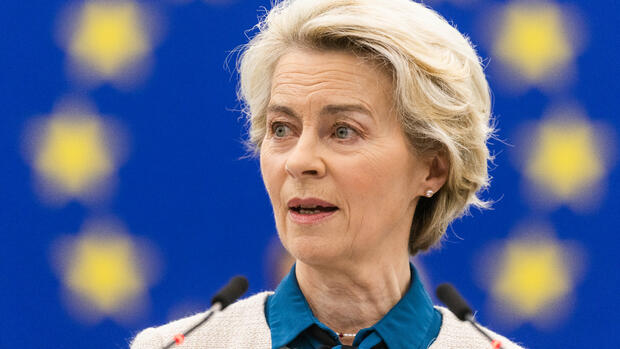Critics fear that the Commission’s plans will result in a “real name requirement through the back door”.
(Photo: dpa)
Berlin There is resistance in the traffic light coalition to plans from Brussels for the EU wallet. This is a digital wallet in which all citizens can store important documents, for example on their cell phones.
This can include, for example, your identity card, driving license or birth certificate in order to identify yourself online to authorities, banks or companies such as airlines or car rental companies.
Business and politics see this as one of the most important digital projects in Europe. It should enable things that have so far only worked with paper or via complicated digital alternatives to be both safe and simple. In Germany, the Federal Ministry of the Interior is implementing the plans.
In the ongoing negotiations, the EU Commission has now spoken out in favor of changing the project in one key point. Accordingly, the proposed right to authenticate oneself without passing on personal data such as name or date of birth should be deleted.
This emerges from the text of the ongoing trilogue procedure on the law, i.e. the coordination between the EU institutions. It is available to the Handelsblatt. Originally, the right to a pseudonym should apply wherever it is legally possible, for example on video platforms or in social media.
“If it turns out that this is being misused as a back door for a real name requirement, we will have to take countermeasures at the national level,” said the FDP’s digital policy spokesman, Maximilian Funke-Kaiser, to the Handelsblatt. “Because from the point of view of the FDP, there should not be a real name requirement on the Internet.” The responsible rapporteur for the CDU parliamentary group, Markus Reichel, sees the danger of a “real name requirement through the back door”.
The disputed passage was particularly important from the point of view of the European Parliament, as it was intended to rule out that offers from corporations such as Meta or Google could only be used with their real names. Millions of users are registered there with a pseudonym to protect their identity.
Negotiation in a “critical phase”
Even according to the Commission’s wishes, such a pseudonym cannot be banned. But critics see the danger that platform operators will circumvent this by, for example, requiring real names for authentication.
Funke-Kaiser said people should therefore retain the right to use the Internet anonymously wherever there is nothing against the law. “This is a protective cover for politically persecuted people or minorities from discrimination, extremist violence and sexual attacks.”
In the worst case, platform operators could indirectly oblige users to use their real names, it is feared.
(Photo: Reuters)
At the same time, there is no reason for a real name requirement. The federal government is taking action against hate crime with the Digital Violence Protection Act.
The EU Commission’s demand also alarmed civil rights activists. A letter from the Austrian organization Epicenter Works to members of the Commission and Parliament said the Commission’s latest proposal was “alarming”.
Under the current conditions, the EU wallet is not secure, “and as members of civil society and Europeans who care about privacy, we must warn citizens against using it,” the organization warns in the letter available to Handelsblatt .
Because the removal of the right to a pseudonym is a gift to companies like Google and Facebook. “Without a right to freely chosen usernames, Big Tech’s surveillance business model will soon have the real names of all EU citizens using the EU wallet.”
However, it is questionable whether the EU Commission’s proposal will go through. From the point of view of EU parliamentarian Tiemo Wölken, there will be “no real name obligation in the new law on digital identity” with the European Parliament. “This is a priority for European social democracy in these negotiations and is also clearly stated in the negotiating mandate of the European Parliament,” the SPD politician told the Handelsblatt.
More: Business complains about the expensive proliferation of European data protection regulations
